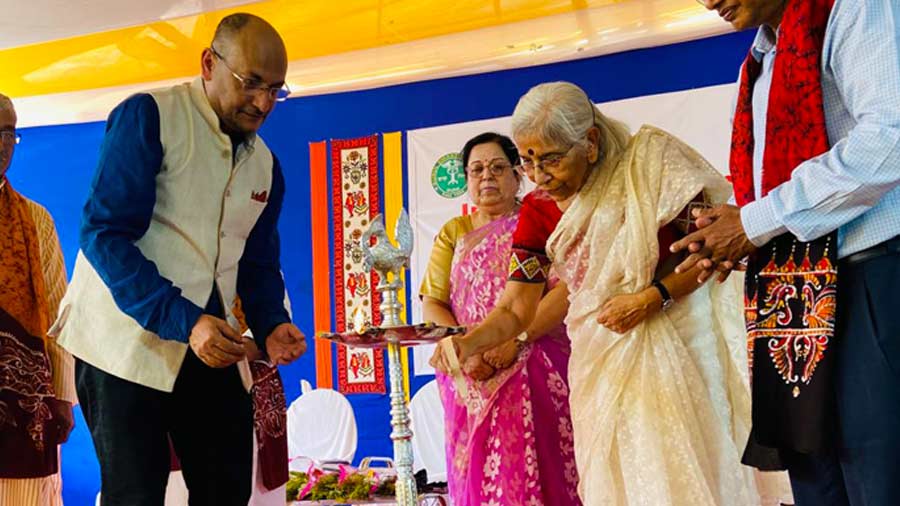Barack Obama, former president of the United States, once tweeted, “Reading is important. If you know how to read, then the whole world opens up to you.” It’s a philosophy READ India believes in. As a Trust in 2007, READ (Rural Education and Development) began to set up community libraries and resource centres around the country. They now have 54 centres across 13 states. The newest is in Surul near Santiniketan – Bengal’s seat of learning and home to two of our Nobel Laureates. My Kolkata caught up with Kalpana Dasgupta, a trustee of READ India, who is a former librarian of the National Library of India in Kolkata as well as former director of Central Secretariat Library in New Delhi. She happens to spend at least six months of her year in Santiniketan, and is happy to show us how to read, write (but not really ’rithmetic.)
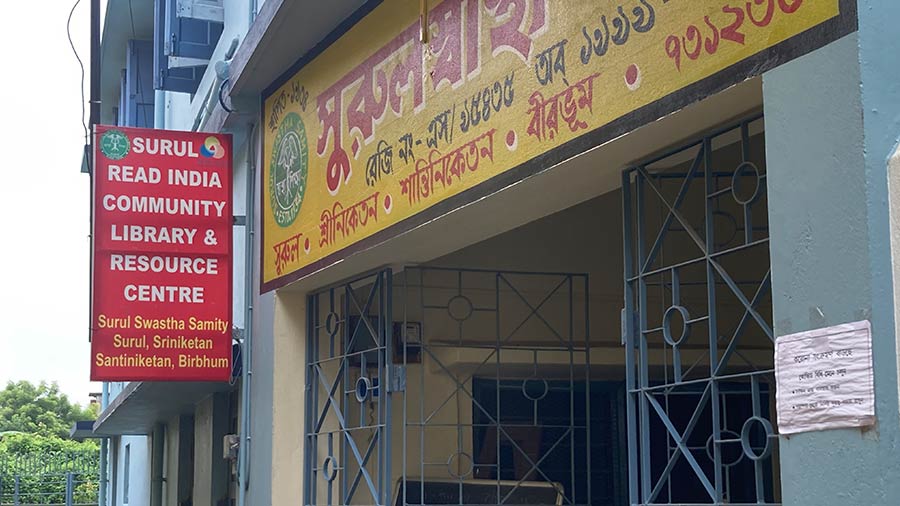
READ India Centre in Surul Swastha Samity Photos: Chandreyee Chatterjee
Before we visit the READ centre in Surul, Dasgupta takes us back to the very inception of READ Global. “Dr Antonia Neubauer (founder of READ Global) was travelling in Nepal when she asked her guide what it is that he would want for the children in his town. A school, perhaps? Or a hospital? The guide said that one of those ‘large rooms which house many books, where people go to read and study’, would be nice, since their children did not have access to books. And that’s how READ Global started.”
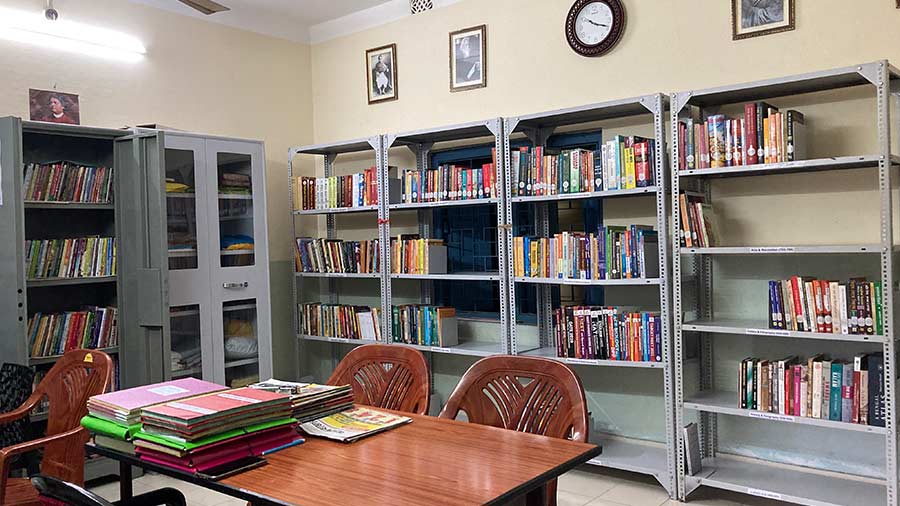
The Surul READ Community Library and Resource Centre
The first edition of this community health centre was inaugurated by Tagore
The Surul READ Library and Resource Centre is housed in Surul Swastha Samity which was established in 1934. A decade before, Tagore had already envisioned a co-operative system to aid rural development, which Visva-Bharati had begun to carry out in villages in Sriniketan. The Surul health co-coperative had its modest beginnings in a small mud house. This was rebuilt only in 1970 on land donated by a descendant of the Surul zamindars, Sri Abhayapada Sarkar. It is in this building that READ has opened its centre.
“The READ model is such that we conduct a survey of the place and then we talk to the people of the community. Usually, the community gives us the land or a place to set it up. Then it becomes a community-led centre. The survey reveals the literacy rate, gender, the percentage of young adults and children in the area, their expectations of the centre, the kind of training programmes they would want, and the economic opportunities that can emerge from these training programmes. The centre caters to all this,” explains Dasgupta.
Surul Swastha Samity has doctors on call and offers health check-ups for the residents of the eight villages it supports. “We have a doctor here in the daytime, a dentist in the afternoon and an ophthalmologist in the evening. Most people coming to us are either running a temperature, or are victims of an accident. Diabetes is a growing problem,” says secretary, Siddharth Mitra. During the pandemic, they were able to arrange close to a hundred oxygen cylinders and had turned the first floor into a quarantine centre with 11 beds.
Read, learn, upskill, work
Other than the library, there is also a room for computer training, a playschool and a training centre at the Surul READ Centre. The library is open from 8am to 7pm and runs like a regular library, which allows its members to borrow a book for 15 days. It houses quite a range, from children’s books to Bengali literature, from English novels to simplified biographies in Bengali. Philosophy, psychology, technology are only some of the genres here. The early learning centre – Tiny Leaves – currently has 11 children, all between the ages of two-and-a-half and three-and-a-half. “It’s run by two women who also teach here, while READ has provided basic infrastructure and agreed to let them keep the fee for the first 10 students,” says Dasgupta.
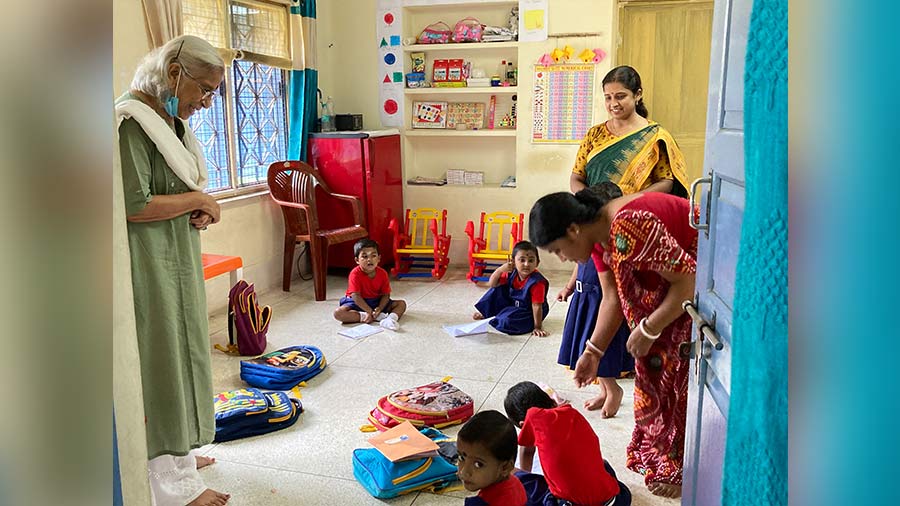
Kalpana Dasgupta (left), trustee, READ India, looks on as the children of the playschool demonstrate their artistry
The centre is currently focusing on a project, being run by UNESCO, concerning menstruation health and hygiene. This involves speaking to a hundred boys/men and girls/ women to understand their attitude towards this issue which is still a social taboo.
The centre has also had a hundred women for kantha stitch training, while 24 have signed up to be trained as health workers for the course, which began in October. These women will learn to monitor blood pressure, administer injections and execute other basic nursing duties. Meanwhile, 47 women are undergoing a six-month computer training course which requires the applicants to have at least passed their Class X exams. Here they are taught the simple functions that will enable them to handle administrative duties in any institution.
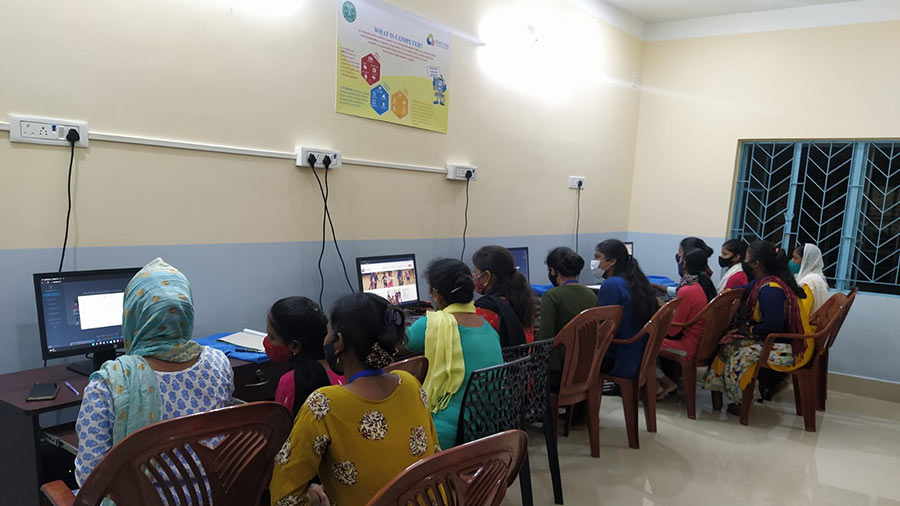
Computer training at the centre
The word of ‘Mataji’ still counts!
“Most of the women who are doing well, are fighting the prevalent patriarchy. It’s often a battle for them to go against their fathers and brothers. These battles are slowly being won. In some states, the women who have signed up with us are now asking for leadership training and soft skills as well. They are ambitious and determined to break free of the social shackles holding them back,” says Dasgupta, going on to describe the suspicion and scepticism they are often met with when a READ centre opens. “I have personally gone and spoken to elderly women in the village to convince them to send the younger women in the family to the library, since it’s a safe place which will aid their education and employment. Eventually, they do come around to it and even begin to like the idea of it. My grey hair is useful… the word of ‘Mataji’ counts you see,” she laughs.
During the pandemic, READ India formulated hybrid training models combining both online (video conferencing) and offline (centre/common community spaces) platforms. This increases the outreach of a particular project. Zoom, WhatsApp and Google Docs are some of the platforms used to disseminate content. Hard Skills training such as stitching and handicrafts are conducted with the help of master trainers who hold demonstrations in small batches. The activities of Surul READ Centre are organised by different committees which represent men and women, both young and elderly. Their involvement is an asset for the centre.
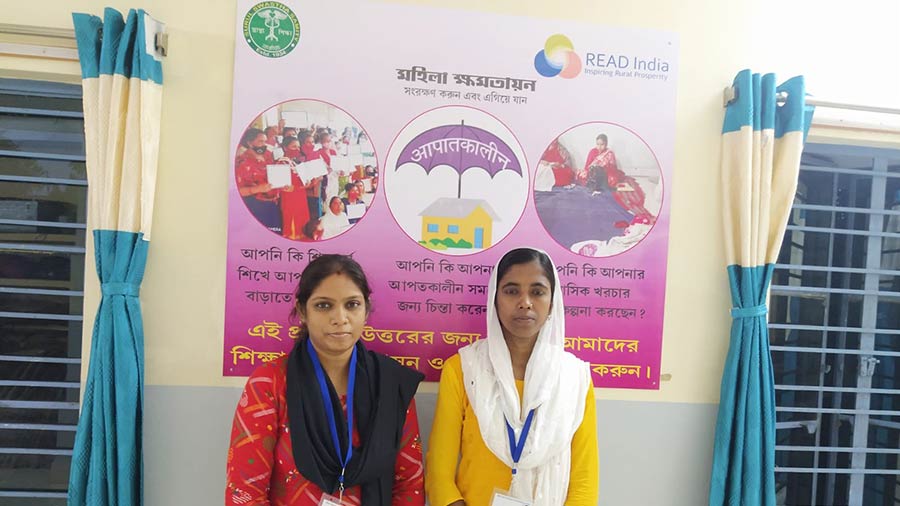
Sikha Das (left) and Azmin Nasir of Bolpur have signed up for computer training at Surul READ Centre. They both have a Masters degree in Bengali. Sikha borrows books from the library for her five-year-old son and she has also been a tuition teacher. She hopes that knowing how to use the computer will enhance her employability. Azmin is 22 and is simply hoping to find a job
In Numbers: Impact on beneficiaries of READ India around the country in 2021-2022
- Secured jobs – 3,138
- Started new business – 3,849
- Increased Income – 13,353
- Grew Existing Business – 2,130
- Increased Career Resilience – 2,208
